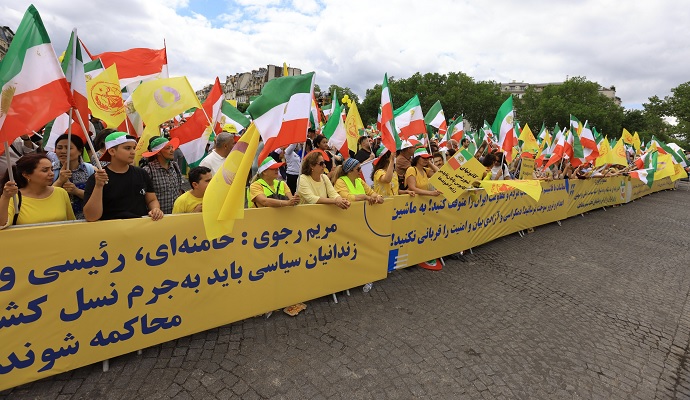In response to a series of political blows from Iran’s Resistance on the global stage, the theocratic regime has undertaken an unconventional move, threatening legal action against the People’s Mojahedin Organization of Iran (PMOI/MEK). Through a public announcement, the regime has summoned more than a hundred individuals to appear before a criminal court in Tehran province, with a one-month deadline for legal representation. Non-compliance may result in legal consequences as per the law, the statement has warned.
Although the regime’s threat of using the law against the Resistance may appear dubious, it is not entirely unexpected. Notably, 124 former world leaders and 3,600 lawmakers from 40 countries, including 29 parliamentary majorities and representing 61 parliaments, have jointly called for the prosecution and accountability of the regime’s leadership for their crimes against humanity. These calls are specifically focused on the 1988 massacre of 30,000 political prisoners.
In face of a growing international wave of support for the Iranian people, driven by numerous domestic uprisings and four decades of organized Resistance, the regime’s response has been to summon MEK members by its judiciary, which is notorious worldwide for its executions and torture.
However, the regime has never treated the MEK according to the “law.” The regime’s former Supreme Leader, Ruhollah Khomeini, issued a fatwa in 1988 stating that all members of the MEK should be executed if they remain loyal to their beliefs. Then-Attorney General Abdul-Karim Mousavi Ardebili also declared in 1988 that there was no need to create files for the MEK as their fate is already sealed. Mohammad Mohammadi Gilani, a so-called Sharia judge, also ordered, “You ought to execute the Mojahedin on the spot.”
Hence, resorting to legal theatrics after four decades of massacre and slaughtering the MEK and their supporters is obviously a manifestation of the regime’s vulnerability and desperation in face of the growing wave of international consensus on the need to hold the regime accountable for its many crimes, including the massacre of MEK members.
Javaid Rahman, the UN’s special rapporteur on the human rights situation in Iran, has openly criticized the regime for its lack of accountability and continued impunity concerning the crimes committed in Iran. He has called for an international investigation into the mass killings of political prisoners in 1988.
As the Iranian society faces explosive conditions and growing dissent against the regime, the current Supreme Leader, Ali Khamenei, exhibits great concern about the organized Resistance and seeks new, albeit absurd, approaches to boost the morale of his diminishing forces and instill fear in revolutionary youth.
Previously, the regime attempted to discredit the MEK through fabricated trials and manipulation of the judicial system. In the 1990s, during a brutal cleansing of the regime’s opponents that became known as the “chain murders of Iran,” the regime’s Ministry of Intelligence (MOIS) assassinated three Christian pastors and falsely accused the MEK for their deaths. By orchestrating a mock trial and involving three women who testified to be MEK members, the MOIS was trying to blame the organization for its own heinous crimes.
However, these efforts proved futile when, in October 1995, the regime invited the UN Special Rapporteur on the Situation on Iran to attend a staged court. Upon his return, the UN official exposed the trial as a fabrication, revealing that the three women were, in fact, government agents acting in the government’s interest. Consequently, the announced punishment against them would never be implemented, he had concluded.
Despite past failures, it appears that desperation has driven Khamenei to repeat old tactics once again. This recent maneuver provides insight into Khamenei’s main concern and reveals the primary target of his threats. Ahmad Zeydabadi, a regime insider, warned about the consequences of this new political maneuver, stating, “This trial provides an opportunity for the organization (MEK) to present itself in its propaganda as the main opposition and victim of the system.”
Even the Farhikhtegan daily, affiliated with Khamenei’s senior adviser Ali Akbar Velayati, also warned, “Even if the process of investigating the cases is completed and if these individuals are convicted, it is unlikely that these actions will yield any particular benefits and cause harm to the MEK organization.”
Given the unwavering faith and proven track record of Iran’s Resistance, which has triumphed against the regime in any fair trial under international supervision, it naturally and obviously welcomes any genuinely legal initiative. The Resistance hopes that Tehran will go beyond the farcical and fabricated trials and engage in confronting the Iranian Resistance with the rule of law. Because then, it will become evident who are the real terrorists and violators of human rights.





